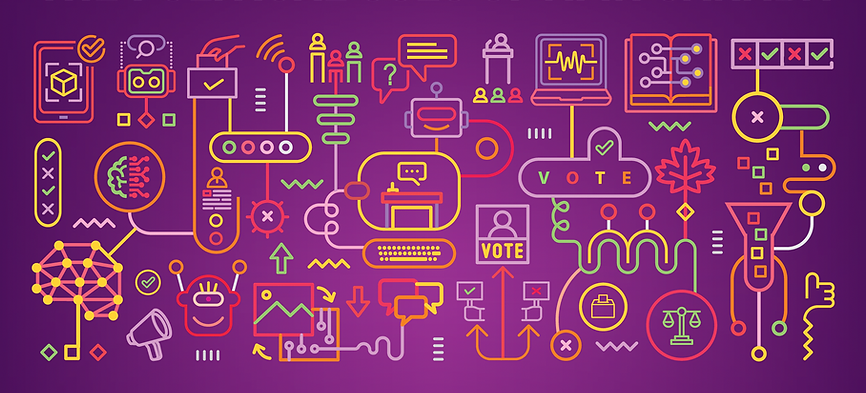
The University of Ottawa Research Chair in Politics, Communication and Technology and the AI + Society Initiative releases The Political Uses of AI in Canada, a new report by Michelle Bartleman and Dr. Elizabeth Dubois.
As machine learning and artificial intelligence are advancing and becoming more accessible, political actors are starting to experiment with these tools. From creating synthetic content to detecting disinformation to tracking harassment to predicting voting outcomes, AI-enabled technologies are playing an increasing role in democratic election processes.
In a new report,The Political Uses of AI in Canada, PhD candidate Michelle Bartleman and CLTS Faculty member Dr. Elizabeth Dubois look at key cases highlighting specific uses of AI in the Canadian political context.
When Toronto mayoral candidate Anthony Furey released his platform in June 2023 ahead of the city’s election, it got people talking. Unfortunately, it wasn’t about his policies, but about the photo of a woman with three arms. It turns out that Furey’s campaign had used generative AI to create synthetic images for the platform document. In addition to the three-armed women, others pointed out the name tag with illegible writing, a trafficless downtown street that can’t quite be identified, and a strangely orderly tent city in the middle of a popular city park.
The report also discuss the use of conversational agents, AI-generated video spokespeople, a X/Twitter bot that detects toxic tweets during Canadian elections, and more. The list is not exhaustive, and indeed, many applications of AI take place behind the closed doors of corporations, in the strategic war rooms of election campaigns, or are intentionally obscured making it harder to identify.
As noted by Dr. Dubois, “Sometimes we’re tempted to think of AI as independent entities with agency. While these tools have some decision-making ability, they are designed by humans, built by humans, and trained by humans. So, it follows that, as humans, we can also choose how we want to use these tools, what guardrails to put up, and how to make these systems transparent and equitable.”
The report aims to spark discussion on the ways AI has been and could be integrated into different phases of the election cycle. Steering away from how the Canadian government is using AI to regulate and govern, which is already being studied in a number of contexts, the report attempts to better understand how AI is being applied in political processes, how Canadians’ political lives are being marked by AI-enabled tools and the ways these are affecting how Canadians make political decisions.
The report is also available in French.
This new report also builds from the insights from a panel discussion held in April 2023 with five contributing scholars Dr. Samantha Bradshaw, Dr. Wendy Hui Kyong Chun, Suzie Dunn, Dr. Fenwick McKelvey, and Dr. Wendy H. Wong, who also outlined critical challenges and point toward next steps, with an eye on finding ethical ways to integrate new technologies into political practices.
Michelle Bartleman is PhD candidate in the Department of Communication in the Faculty of Arts, a member of the Pol Comm Tech Lab, and an affiliate of the Centre for Law, Technology and Society at the University of Ottawa.
Dr. Elizabeth Dubois is the University Research Chair in Politics, Communication and Technology and an Associate Professor in Department of Communication at the University of Ottawa where she runs the Pol Comm Tech Lab and is a Faculty member at the Centre for Law, Technology and Society. Her work examines political uses of digital media including media manipulation, citizen engagement, and artificial intelligence.
This report are made possible with the support of the Scotiabank Fund for the AI and Society Initiativeand University of Ottawa Research Chair in Politics, Communication and Technology.
